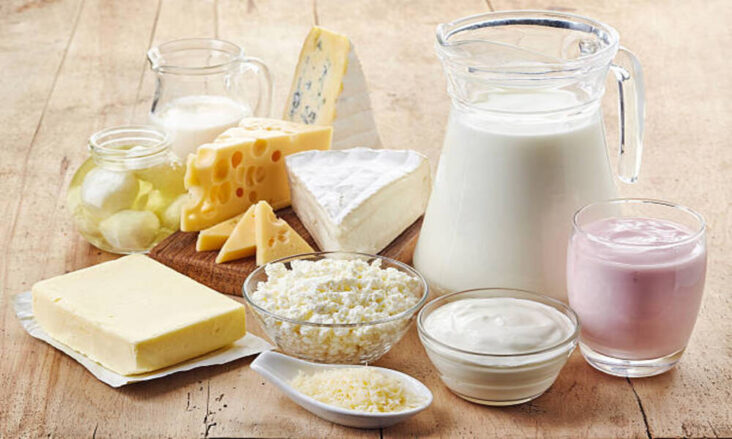Make an Appointment
There are many benefits of dairy products. Consuming these products provides health benefits especially building and maintaining strong bones. They help you have a healthy weight. Foods in the dairy group provide nutrients that are vital for the health and maintenance of your body.
Dairy products are also healthy for your teeth and gums
by reducing your risk for gum disease. Dairy products are high in calcium, vitamin D, vitamin A, magnesium, zinc, and protein. We use the calcium that we get from dairy products to build our bones, to help our blood clot, to make sure our nerves work well and to help build strong muscles. These nutrients include calcium, potassium, vitamin D, and protein.
Health benefits associated with dairy foods extend far beyond building and maintaining healthy bones and teeth. Having enough milk, yoghurt and cheese can also be good for heart health, blood pressure and maintaining a healthy weight. Milk, cheese and yoghurt are naturally full of important nutrients such as calcium and protein. The unique package of vitamins and minerals they provide means these dairy products pack some pretty important health benefits. Many people do not get enough potassium. Diets rich in potassium may help to maintain healthy blood pressure. Dairy products, especially dairy milk and yoghurt, and fortified soy milk, provide potassium.
Vitamin D functions in the body to maintain proper levels of calcium and phosphorous, thereby helping to build and maintain bones. Milk and soy milk that are fortified with vitamin D are good sources of this nutrient. Other sources include some fish such as salmon, and other foods fortified with vitamin D. Consumption of milk, cheese and yoghurt is linked to a reduced risk of heart disease, stroke, hypertension, type 2 diabetes, metabolic syndrome and colorectal cancer.
Fermented dairy products such as yoghurt, culture drinks and kefir are some of the most common and easily available sources of probiotics. These products are an ideal vehicle for probiotics as the composition of milk which includes carbohydrates, protein and fat acts as a protective matrix to help the survival of probiotics from the digestive system through to the gut, including helping them survive the adverse conditions of the stomach.
Bones are living tissue, constantly in a state of renewal, so building and maintaining bones from childhood through to elderly age is important. The key ingredients for strong bones for life include weight-bearing exercise, calcium-rich foods such as milk, cheese and yoghurt, as well as vitamin D from safe sun exposure.
Not looking after bones can increase the risk of osteoporosis, a disease where bones become brittle and are at high risk of fracture. Bone health is determined by both genetics and lifestyle factors, and adopting a bone-friendly lifestyle at any age can help reduce the risk of osteoporosis.
Achieving dental health involves more than just the right oral hygiene. Healthy nutrition and eating habits also help to keep teeth healthy. Dairy foods have a specific role to play in dental health as they contain a unique combination of special anti-decay nutrients such as calcium, phosphorus and the protein, casein. Milk has been linked to reduced risk of cavities, making it a good drink choice between meals and hard cheese has been linked to decreased risk of dental cavities and erosion
Maintaining healthy body weight is a matter of balancing the energy taken in with the energy used through daily activities or exercise. When trying to lose weight through a calorie-controlled diet, studies show that including at least three serves of milk, yoghurt or cheese a day can help people lose more weight, more centimetres from the waist and more body fat compared to people who ate fewer serves of dairy foods. Therefore there are several benefits of dairy products associated with human health. Consuming dairy products is a must for good health.


22 Comments
Pingback: What is iodine deficiency? - Sujata Birla Hospital
Pingback: Why do we need calcium? | Sujata Birla Hospital
Pingback: How can you control blood pressure? | Sujata Birla Hospital
Pingback: How can you lower your cholesterol? | Sujata Birla Hospital
Pingback: Why does abdominal pain happen? | Sujata Birla Hospital
Pingback: Yash Birla's food habits | Mr. Yash Birla
Pingback: Yash Birla’s food habits – Mr Yash Birla
Danniel
Nice post. I learn something totally new and challenging on blogs every day. It’s always useful to read through articles from other writers and practice something from other websites.
Pingback: Vegetarian Sources of Protein | Birla Healthcare
Leo
This is a good subject to talk about. Generally, when I come across these sorts of things I like to post them on Digg. This article probably wont do well with that crowd. I’ll take a look around your site though and submit something else.
Pingback: Food for Muscle Building | Bodybuilding | Yash Birla Healthcare
Pingback: Food for Muscle Building – Birla Healthcare
Pingback: Celiac Disease | Symptoms & Causes | Sujata Birla Hospital
Pingback: Best Sources of Vitamin A | Sujata Birla Hospital
Pingback: Best Sources of Vitamin A – Sujata Birla Hospital
Pingback: What does healthy eating mean? | Yash Birla Healthcare
Pingback: 5 Common Myths About Healthy Nutrition | Yash Birla Healthcare
Pingback: Health Benefits of Cottage Cheese (Paneer) | Yash Birla Healthcare
Pingback: Home Remedies For Migraine – Birla Ayurveda
Pingback: Food Habits of Yash Birla – Mr Yash Birla
Pingback: Supplements for Muscle Strength or Gain | Birla Healthcare
Pingback: 7 Non-Dairy Foods That Are High In Calcium | Yash Birla | Birla Healthcare